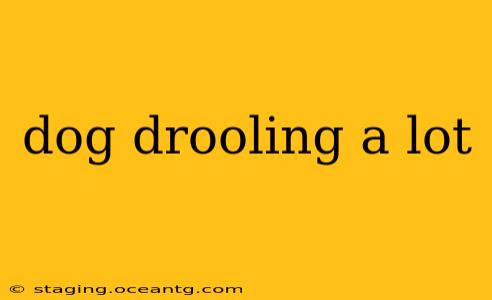Excessive drooling in dogs, also known as hypersalivation, is a common problem that can stem from various causes, ranging from simple discomfort to serious underlying health issues. Understanding the reasons behind your dog's increased drool can help you determine whether it's a cause for concern and when professional veterinary attention is needed. This comprehensive guide explores the potential reasons for excessive drooling and provides guidance on how to address this issue effectively.
Why is my dog drooling so much?
This is a question many pet owners ask. The amount of drool a dog produces is influenced by breed (some breeds are naturally drooly, like Mastiffs and Saint Bernards), age, and individual temperament. However, a sudden increase in drooling should never be ignored. Several factors can trigger excessive drooling, including:
-
Nausea: If your dog feels nauseous, they may drool excessively. This can be a symptom of various problems, from mild indigestion to more serious conditions like kidney disease. Observe other symptoms like vomiting or lethargy.
-
Excitement or Anxiety: A highly excited or anxious dog may drool more than usual. Think about upcoming vet visits, fireworks, or thunderstorms; these events can trigger increased salivation.
-
Mouth Irritation: Anything irritating your dog's mouth, such as a foreign object, a sore, or a dental issue, can lead to excessive drooling. Check their mouth carefully for any abnormalities.
-
Heat Stroke: Dogs pant to cool down, but excessive panting coupled with drooling can indicate heat stroke, a potentially life-threatening condition. Provide cool water and seek veterinary assistance immediately if you suspect heatstroke.
-
Poisoning: Ingestion of certain toxins can trigger excessive salivation. If you suspect poisoning, contact your veterinarian or an animal poison control center immediately.
-
Certain Medications: Some medications have drooling as a side effect. If you've recently started your dog on a new medication, consult your vet.
-
Underlying Medical Conditions: Several serious medical conditions can manifest as excessive drooling, including:
- Kidney disease: Kidney failure can cause various symptoms, including increased thirst and drooling.
- Liver disease: Similar to kidney disease, liver problems can cause a range of symptoms, including excessive drooling.
- Rabies: While rare in vaccinated dogs, rabies is a serious viral disease that causes excessive drooling, among other neurological symptoms. This is a veterinary emergency.
- Infections: Oral infections, such as gingivitis or abscesses, can lead to increased salivation.
Is excessive drooling in dogs dangerous?
The danger of excessive drooling depends entirely on the underlying cause. While some reasons are relatively harmless (excitement), others, such as poisoning or rabies, require immediate veterinary intervention. The key is to identify the cause.
When should I take my dog to the vet for excessive drooling?
You should take your dog to the vet if the drooling is:
- Sudden and severe: A rapid increase in drooling warrants a veterinary check-up.
- Accompanied by other symptoms: Vomiting, lethargy, loss of appetite, difficulty breathing, or changes in behavior should prompt immediate veterinary attention.
- Persistent: If the excessive drooling lasts for more than a day or two, it's best to seek professional veterinary help.
How can I stop my dog from drooling so much?
Addressing excessive drooling requires identifying and treating the underlying cause. If the drooling is due to excitement, try to minimize stressful situations. If it's due to a medical condition, veterinary treatment is necessary. In some cases, simple adjustments, like providing fresh water or ensuring proper dental hygiene, might suffice.
What breeds of dogs drool the most?
Certain breeds are predisposed to drooling due to their genetics and jaw structure. These include breeds like Saint Bernards, Mastiffs, Bulldogs, Bloodhounds, and Great Danes, amongst others. However, even within these breeds, the amount of drooling can vary significantly.
My dog is drooling excessively, but otherwise seems fine. Should I still be worried?
Even if your dog seems otherwise healthy, persistent or sudden excessive drooling warrants a veterinary examination. It's better to be safe than sorry, as it could indicate an underlying issue that may need treatment.
This information is for general knowledge and does not constitute medical advice. Always consult with a veterinarian for any concerns regarding your dog's health. Early diagnosis and treatment are crucial for managing any underlying medical conditions and ensuring your canine companion's well-being.
